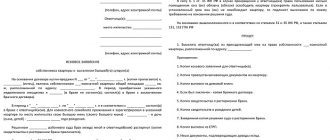Home / Housing disputes / How to evict your ex-wife from an apartment
The divorce of spouses inevitably leads to the solution of the housing problem. Often, if the apartment is owned by a spouse, he will have to evict his ex-wife. How this will happen: by mutual agreement or in court - depends on the relationship between the partners. The ex-wife's obvious reluctance to evict voluntarily leaves no other option but to take legal action.
Let us dwell on the specifics of eviction of an ex-wife. After reading our article, you will learn how to expel your ex-wife from your apartment through the court.
We recommend that you find out when they will be provided with other housing, and when they will be evicted without providing new housing?
Is it possible to evict your ex-wife?
According to the law, the spouse is one of the family members of the owner of the apartment, and therefore has the full right to live in the residential premises (Clause 1, Article 31 of the Housing Code of the Russian Federation). If the apartment belongs to the husband, he issues registration for his wife. Joint ownership, i.e. The common property of the husband and wife belongs to both on an equal basis (with the exception of the terms of the marriage contract).
Divorce of spouses is considered the termination of family relations. Immediately after receiving the divorce certificate, the wife loses the right to use her husband’s apartment (Clause 4, Article 31 of the Housing Code of the Russian Federation). It is assumed that the spouse is the sole owner of the residential premises. The opposite situation is in the case of a shared apartment - the wife owns exactly half of the property.
Thus, in order to evict an ex-wife, two conditions are necessary:
- Divorce in the registry office or court;
- Loss of the right to use housing by the ex-wife.
Following this, the divorcees will have to decide how exactly they plan to carry out the eviction: will the wife visit the “passport office” on her own or entrust the housing issue to the court?
Divorce from wife
Mikhail bought an apartment in 2013 and got married six months later. The couple began to live together, and later they had a child. The man registered all members of his family in his premarital apartment. However, family life did not work out, and the wife left with the child to her own apartment in the Moscow region. All attempts to reconcile ended in failure, and a year later the couple divorced.
About 5 years passed after the divorce and Mikhail began to think about a possible change in his marital status. In addition, there was an option to acquire a larger living space, but this required selling the previously purchased apartment. But it all boiled down to the fact that the wife refused to be discharged voluntarily and register the child in her own apartment. Therefore, our client began to look for possible ways out of this situation. Selling living space with people registered there was not at all an attractive option; few people would want to buy such an apartment, and they would have to give up significantly in price.
He also could not force his wife to leave. Therefore, the most optimal solution was to be discharged from the apartment through the court. It was possible to do this in this situation; it was only necessary to organize the entire process correctly. Therefore, Mikhail turned to our lawyers for help.
On the issue of deregistering former family members from your living space, you can consult a lawyer at: + or via WhatsApp.
Grounds for eviction
So, one of the grounds for evicting an ex-wife from an apartment is an official divorce.
Not all spouses have separate housing, so they often live in a municipal apartment. The manager of the property is not the husband, but the municipal authority. Therefore, a divorce certificate alone will not be enough to evict an ex-wife. The employer (husband) will need to provide compelling reasons for his ex to move out.
Reasons for eviction of the ex-wife from a municipal apartment:
- Long-term absence from the place of residence (for example, if a woman moved to a new partner);
- Systematic violation of the rights of neighbors (see “How to evict noisy neighbors from an apartment”);
- Abuse of alcohol, drugs, and illegal substances are grounds for deprivation of parental rights if there is a child;
- Debt for housing and communal services for more than six months (see “Eviction from an apartment for non-payment of utilities loses its meaning. One option with eviction is allowed - voluntary.
Example: The Kovalevs lived in a municipal apartment for 5 years, after which they submitted documents for privatization. Since there were no other applicants for the apartment, the Kovalevs transferred the property into joint ownership. The subsequent divorce raised the question head on: how to divide a privatized apartment? Kovalev wanted to evict his ex-wife, believing that he had more rights to housing. The man provided the court with receipts for utility bills, checks for repairs, as well as for the purchase of furniture and equipment. However, the court turned him down - the privatized apartment is jointly owned by both spouses. When dividing property, you will need to allocate the shares of the husband and wife, and if this is not possible, exchange the apartment. Kovalev could not evict his ex-wife from a privatized apartment, just as the ex-wife could not do the same in relation to her former chosen one.From a council apartment
Just living in a municipal apartment does not give spouses ownership rights to residential premises (at least until privatization). Both spouses have permanent registration. It does not matter who is the responsible employer under the social tenancy agreement - the husband or wife.
It follows that the spouse will not be able to expel his ex from the municipal apartment on the grounds of divorce alone . You will need a whole list of reasons that we reported above. Let us remind you that this is deprivation of parental rights, damage to property, non-payment of utilities, violation of silence, etc.
If registered
Registration of a wife in her husband's apartment is limited by the latter's wishes. If the owner wants to evict his ex-wife, no difficulties will arise.
The basis is clause 4 of Art. 31 of the Housing Code of the Russian Federation, from which it follows that in the event of termination of family relations, the wife loses the right to use her husband’s apartment. Before you evict your ex-spouse, you first need to sign her out:
- through OVM or MFC - with consent;
- by filing a claim in court - if you do not want to evict yourself.
Difficulties arise if the ex-wife has nowhere to live. For example, she is experiencing financial difficulties or needs constant care for health reasons. In such situations [anchor href=»law-divorce.ru/otsrochka-ispolneniya-resheniya-suda-o-vyselenii-iz-zhilogo-pomeshheniya/»]eviction will be delayed for at least six months.
If not registered
The simplest development of events is if the ex-wife does not have registration in her husband’s apartment. This happens quite rarely, for example, if the wife is registered in her parents’ apartment in the same locality.
The ex-husband can evict his wife from his apartment without involving the court. It is enough to write a statement to the district police officer, draw up a report on the persons living in the apartment, and then oblige the wife to vacate the living space.
How to evict your ex-wife from an apartment if she is registered - through the court
The presence of registration and the reluctance of the ex-wife to leave the apartment complicates the life of the owner. As practice shows, litigation is the only way to rid yourself of the presence of an annoying spouse. We talked about this in detail in the article “How to evict your ex-spouse from the owner’s apartment.”
Step-by-step instructions: stages
The wife’s categorical refusal to move out of her husband’s apartment leads to litigation, where it will be determined whether the ex-wife will be evicted or given a deferment due to financial difficulties.
Stages of evicting an ex-wife from an apartment:
- Try to resolve the issue at the pre-trial stage
Submit an eviction notice or demand. Certified mail or personal delivery of the notice in the presence of two witnesses will do. There is no need to worry if your spouse refuses to move out voluntarily - at least you will have evidence of an amicable attempt to resolve the dispute.
- Make a statement of claim
It is advisable to consult a lawyer and find a sample of filling out the form. It will be necessary not only to evict the ex-wife, but also to recognize her as having lost the right to use the residential premises.
- Defend your rights and get a court decision
The plaintiff’s convincing arguments, coupled with a reference to the law (clause 4 of Article 31 of the RF Housing Code) increase the chances of success in the upcoming case. The district judge issues the order, after which there is a period for appeal. If the spouse does not file an appeal, the plaintiff will only have to take a copy of the writ of execution and take it to the Bailiff Service.
- Ex-wife's statement
Before resorting to eviction, the husband must remove his wife from registration. To do this, you need to fill out an application at the “passport office”. The basis will be a writ of execution. (see “How to write out your ex-wife?”).
- Move your ex-spouse
Give your former family member time to move: removing furniture, equipment, pets, cleaning the apartment - this may take from 5 to 7 days. If, after the agreed period, the ex-wife has not moved out, contact the Bailiff Service (BSR) at your place of residence.
List of documents
Judicial eviction of an ex-wife involves filing a statement of claim.
Simultaneously with the claim, the apartment owner must prepare a package of documents, which includes:
- a copy of the Russian passport - you will also need the original;
- a copy of the marriage certificate;
- a copy of the divorce certificate - issued by the registry office;
- a copy of the extract from the Unified State Register of Property Rights (new) or the old Certificate;
- a copy of the house register - an extract on the number of residents;
- receipt of payment of state duty;
- power of attorney + copy of the representative’s passport – if the spouse entrusted judicial participation to his proxy;
- a copy of the defendant’s notice of filing a claim in court - an innovation from October 1, 2021;
- evidence of rights violated by the spouse - for example, complaints from neighbors, statements of personal accounts (debt), protocols from the district police officer, a court decision to deprive the mother of parental rights, etc.
The collected documents are drawn up in a single package - the plaintiff must prepare at least 3 packages with copies of documentation: for himself, for the defendant and for the district court.
Sample claim for eviction of ex-wife
Compiled in writing according to the sample on a blank A4 sheet. You can pick up the finished form at the office of the district court, where they accept appeals in connection with the eviction of your ex-wife.
What information to include in the statement of claim:
- addressee - the name of the district judicial authority (at the place of registration of the disputed real estate);
- plaintiff – full name, registration address, contact phone number, etc.;
- defendant – full name, place of residence, contacts + name of the “passport office”, if the plaintiff wants to discharge the defendant;
- what circumstances prompted you to seek judicial protection;
- what the claims are based on - to evict the ex-wife due to the termination of family relations;
- information about attempts to pre-trial conflict resolution;
- references to legal norms (articles of the RF Housing Code);
- specific claims - what the plaintiff is asking for;
- Below is the date and signature.
How long will it take?
Litigation is not a quick process. The first hearings in the case are scheduled a month after the filing of the claim. The minimum period for consideration of cases of eviction from an apartment is 2-3 months , the maximum is up to six months.
State duty
The owner of the apartment bears the costs of filing a claim with the district court - the cost is 300 rubles per claim (for example, to evict an ex-wife). Along with eviction, you need to remove your ex-wife from the registration register if she is registered in the apartment. Both claims are declared as one, so the amount of the claim will not change.
Read more about this in the article “Statement of claim for eviction and deregistration.”
Arbitrage practice
Analysis of judicial practice allows us to identify common points that attract attention. It is forbidden to make a decision without weighing all the facts, ignoring the opinion of the other party and, in particular, the financial capabilities of the spouses.
The nuances of considering cases of eviction of an ex-wife:
- If the spouse is incompetent, has lost the ability to work, or is a disabled person of group I-II, it is impossible to evict her.
- If the wife cannot provide herself with new housing, the court decides to defer the eviction. Based on practice, this period can range from 3-6 months to a year.
- If a spouse wants to evict his ex from a municipal apartment, a divorce certificate alone is not enough. If there are no other grounds, the wife will retain the right to live in a non-privatized apartment.
- If the property is jointly owned, it will not be possible to evict the ex-spouse. The most affordable option is to exchange an apartment. At the same time, the deal should not run counter to the interests of both parties. If the wife refuses the options proposed by her husband, the husband has the right to go to court to force the exchange of real estate.
Example: After being married for 40 years, the couple decided to get a divorce.
Both retired due to old age, their children had already grown up and lived in other cities. The husband got the apartment from his grandmother; the wife only had a residence permit. I had to resolve the issue of evicting my ex-wife from her husband’s apartment. The woman did not want to move out voluntarily, citing her small pension and lack of other housing. The husband demanded that the court forcefully evict his ex-wife. The reason was stated to be divorce. However, the court rejected the claim, citing the status of the defendant. The ex-wife is considered disabled (retirement), has no alternative place of residence, and the plaintiff himself cannot provide his ex-wife with new housing. Hence the ban on eviction and discharge as such.
From a council apartment
Housing from the municipality cannot be the property of the spouses, since it is received under a rental agreement. Both spouses have the right to live in it by registering there. After the dissolution of the marriage bond, they are assigned the same right to use this area. Therefore, it is almost impossible to expel a spouse from premises received from the municipality.
After an official breakup, the apartment can be called a communal apartment, and the former spouses can be called neighbors. Seek separate payment for utility services and demand repayment of debt on them. She can be evicted if she manages to get new housing, which is practically impossible.
The only basis for eviction may be deprivation of her parental rights, but this requires indisputable evidence, and the procedure itself takes a lot of time. She can be evicted from a non-privatized apartment if she disrupts order, behaves aggressively and bothers her neighbors. You need to do the same as if you had to suffer from violent neighbors - call the police, take statements from neighbors and go to court.
What if there is a wife with children?
Divorcing couples often have children together. How does the eviction of a spouse who remains with a minor occur? Does her husband have the right to throw her out onto the street?
We remind you that the termination of family ties is the basis for the wife to lose the right to use her husband’s apartment. The presence or absence of children does not play a special role. The male spouse has the same rights to the child as the ex-wife. Therefore, eviction does not apply to the child. If you want to find out when and how you can evict a minor from a residential premises, read our article.
However, after a divorce, the child is left with the mother, which means that the eviction of the ex-wife should entail the eviction of the minor. What should I do?
Three options are allowed:
- If the husband is obliged to pay child support , the mother files a claim to provide her and the child with separate housing at the expense of the alimony payer (Clause 4 of Article 31 of the RF Housing Code);
- If the mother is evicted from the father’s apartment , the parents enter into an agreement to determine the child’s place of residence (Clause 3 of Article 65 of the RF IC);
- If there are no questions about the children , the ex-wife moves out from her husband with a minor - compliance with the rule of children living with their parents or one of them.
Expert opinion
Dmitry Nosikov
Lawyer. Specialization: family and housing law.
Meanwhile, from February 17, 2021, if parents divorce, one of them has an obligation to provide the child with housing . Most often, the husband has to pay the expenses due to his high earnings (Clause 1 of Article 86 of the RF IC). The obligation does not arise in all cases, but only in those specified by law. For example, if after a divorce the mother and child have nowhere to live, the father will have to contribute to the payment of a rented apartment or make mortgage payments . The main goal is not to worsen living conditions for a minor child. So that it doesn't turn out like before - the husband kicks his wife and child out of the house, and the latter are forced to huddle in tiny rooms or dormitories. Usually such cases cannot be resolved without trial. It is the court that determines the amount of compensation and other payments in favor of the mother and child. Including monthly alimony.
Thus, the eviction of an ex-wife with a child must take into account the interests of the minor. The issue is resolved jointly with the guardianship and trusteeship authority. It is best if the parents come to an amicable agreement, otherwise they will have to file a claim and establish the child’s place of residence in court.
Housing issues of ex-spouses are the most complex, confusing and lengthy. Often, even the owner cannot evict his wife, who has nowhere to go and is entitled to a reprieve. Or claims arise for the apartment - supposedly it was bought during marriage, improved at the expense of the wife’s funds, and in general should be divided equally. Husbands need to know what to do in such situations? Especially if there are children in the family. Our website's lawyers are ready to provide free consultation. Contact us for help if you have any difficulties with drawing up a claim, wording, documents, or references to laws. Lawyers will explain unclear points and give an algorithm of actions for evicting your ex-wife from the apartment.
Watch the video on how to move your ex-spouse out of your apartment - voluntarily or forcibly:
Attention!
- Due to frequent changes in legislation, information sometimes becomes outdated faster than we can update it on the website.
- All cases are very individual and depend on many factors. Basic information does not guarantee a solution to your specific problems.
That's why FREE expert consultants work for you around the clock!
- via the form (below), or via online chat
- Call the hotline:
- Moscow and the Region
- St. Petersburg and region
- FREE for a lawyer!
By submitting data you agree to the Consent to PD Processing, PD Processing Policy and User Agreement.
Anonymously
Information about you will not be disclosed
Fast
Fill out the form and a lawyer will contact you within 5 minutes
Tell your friends
Rate ( 3 ratings, average: 5.00 out of 5)
Author of the article
Maxim Privalov
Lawyer. 2 years of experience. I specialize in civil disputes in the field of housing and family law.
Author's rating
Articles written
610
If there are children
Divorce is the basis for the wife to terminate her right to reside in her ex-husband’s apartment. This is the law. It makes no difference whether there are minor children in the family or not, since the former spouse and father have the same rights to the children as the mother. It follows that only the mother loses the right to live in an apartment, but not the children together .
However, in the vast majority of cases, children after a divorce remain with their mother, and the eviction of the ex-wife entails the eviction of the child. In such cases, three scenarios are allowed:
- if the husband pays child support, then the wife, according to paragraph 4 of Art. 31 of the Housing Code of the Russian Federation has the right to file a claim for the provision of residential premises to her at the expense of her father;
- parents can enter into an agreement (or the father files a lawsuit) to determine the place of residence of the child with the father (clause 3 of Article 65 of the RF IC), in which case the ex-wife is evicted according to the algorithm that applies when evicting a childless spouse;
- the wife has alternative living quarters and moves there with the children.
In any case, when evicting a former spouse, if there are minor children together, the rights and legitimate interests of the child are taken into account first. In trials of this kind, the presence of a representative of the guardianship and trusteeship authorities is mandatory, and without his consent, the mother and child will not be evicted.











